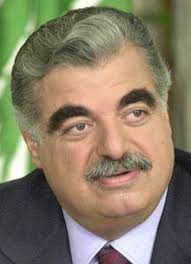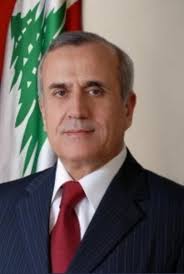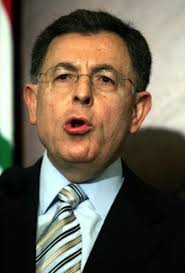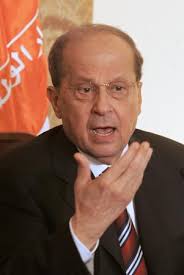
Secretary of State Hillary Clinton visits the grave of former
Lebanese Prime Minister Rafik al-Hariri
during a visit to the
country on Apr. 26. U.S. allies there are leery of the
Obama
Administration's plans for the region.
L'Orient Le Jour, Lebanon
Nothing Wrong with
Hillary Obeying Rituals of Lebanon
"All foreign
guests pray, as Hillary Clinton did, at the tomb of [slain Prime Minister] Rafik Hariri. Tributes to the memory of our assassinated
former prime minister are a denunciation of the despicable
terrorism that killed so many of our leaders in politics and public opinion, is a denial of impunity for the assassins, and an
act of faith in the reliability and impartiality of international
justice."
Editorial by Issa Goraieb
April 29, 2009
Translated By L. McKenzie
Zeiss, Sandrine Ageorges and Nicolas Daghar
Lebanon - L'Orient Le Jour - Original Article (French)
From Hillary Clinton's whirlwind visit to Beirut last
Sunday, we will above all remember her warm and insistent praise of the virtues
of moderation in a country where the most unbridled political passions have
been unleashed these past few years. This fact is hardly fortuitous and precisely
conveys the amount of change that the advent of the Obama Administration
represents for our country.
What hasn't changed one iota, judging by public indications,
is the firm engagement of the United States in favor of the independence,
sovereignty and territorial integrity of our country, as well as the assurance
that its interests will not be sacrificed on the altar of accommodating the
influential states in the region [Syria and Iran]. In that vein, the Secretary
of State hasn't failed to say unambiguously that Washington continues to
support the underlying principles of the Cedar Revolution. [triggered by the assassination of former Lebanese Prime
Minister Rafik Hariri on February 14, 2005].





The
players discussed in this article: former Lebanese Prime Minister Rafik
Hariri, murdered in February,
2005; Lebanese President Michel Sleiman,
elected in a compromise between pro-West and pro-Syria
groups; Émile
Lahoud, Lebanon's pro-Syria president until 2007;
West-friendly former
Prime
Minister
Fouad Siniora; General Michel Aoun, ex-acting prime
minister, MP, ally, pro-Syria and losing popularity among Christians.
What has changed dramatically, however, is America's
evaluation of how best to concretize these ideals, and with them the restoration
of democracy in Lebanon. It is therefore not a question, as it was under George
Bush, of sounding the clarion call morning and night of U.S. support for the
[pro-West] March 14 Alliance
so that its slogans remain popular [this is Lebanon's ruling bloc]. For
the Americans, the man who incarnates that much-vaunted moderation is obviously
President Michel Sleiman,
the only official Hillary Clinton met during her brief stopover in Beirut. The
time is over when deficiency - and then vacancy - regarding the duties of the
president made Prime Minister Fouad Siniora the person
to see and privileged partner of almost the entire global community.
[Editor's Note: When the author
refers to "deficiency" in regard to the presidency, he refers to
former President Émile
Lahoud. When he talks of "vacancy," he refers to November
2007-May 2008, during which the pro-Syria faction led by Hezbullah prevented
the election of a new president. Lahoud was pro-Syria and anti-West, so when
his term ended, Hezbullah and its allies preferred not to risk the election of
a new president, leaving Syria-friendly Prime
Minister Fouad Siniora in the role of acting president. President Sleiman, who was a
consensus candidate, barely made it into office last May.]
Does this necessarily presage a resurgence of Baabda's influence [where the presidential palace is located] on the matter of the distribution of power in Lebanon, which
has been governed for two decades by various interpretations of the Taif
Agreement?
Posted by WORLDMEETS.US
[Editor's Note: The Taif
Agreement, also known as the National Reconciliation Accord, was signed in 1989
and ended the decades-long civil war in that country in part by changing the
way seats in Lebanon's parliament, the presidency and the prime ministership, are divvyed-up amongst the various factions
in the country - in this case, giving less weight to the country's Maronite Christians than had previously been the case].
This would require President Sleiman, a military man who
rose through the ranks and was a consensus presidential candidate elected with
great difficulty - and who has few foot soldiers in the parliament and
government - to rise to the occasion in the genuine free-for-all that dividing
the state pie would necessarily entail. Moderation in Lebanon is not only about
one man, but is a project. It is in fact the emergence of a centrist block at
the end of the forthcoming legislative election that Washington would like to
promote, without seeming to have taken a hand in matters.
It comes as no surprise that the message isn't to everyone's
liking. We've already seen [former prime minister]
General
Michel Aoun decry
the idea of an artificial bloc [based on ethnic or religious orientation]
assigned to the president. Aoun had wanted the
presidency for himself, although by spreading money
around he has already gained a parliamentary bloc of his own.
No less striking in its awkwardness was Aoun's
denunciation of the ritual that all foreign guests are subject to: going to
pray, as Hillary Clinton did, at the tomb of [slain Prime Minister] Rafik
Hariri, when there is already a monument designed for this type of
ceremony: the monument to the Unknown Soldier. For if one likes to believe, like
the general, that no one in this country can claim to hold the unenviable monopoly
on martyrdom; and if it is equally true that while he lived, Rafik Hariri never brought unanimity among Lebanese, it
seems to have eluded Aoun that all of the posthumous
tributes to the memory of our assassinated former prime minister are also, and perhaps
most importantly, a denunciation of the despicable
terrorism that killed so many of our leaders in politics and public opinion, a denial
of impunity for the assassins, and an act of faith in the reliability and
impartiality of international justice.
Indeed, it's time to exhibit an initial demonstration of
seriousness, now that a judge on Lebanon's Higher
Judicial Council will decide the fate of the four generals who were
being held in connection with the Hariri affair - a decision that will not affect
the subsequent legal process. [In a controversial decision this week, Lebanon's
Higher Judicial Council ended
the 44-month detention of four generals implicated in the assassination of Rafik Hariri.] On this occasion, we'll probably hear some brilliant
recollection of how all suspects are presumed innocent until proven guilty. But
is this sufficient cause to release them, in a ritual of the road
to Damascus and without any benefit to the nation, to provide a fig leaf of
innocence to a certain regime that remains to this day, the primary suspect?
[Editor's Note: The author suspects that the release of the
four generals detained in connection with Hariri's assassination indicates a
change of heart on the part of Lebanon's judiciary in regard to pursuing the
Syrians for his murder, i.e.: the ritual of the road to Damascus - and that releasing
these men provided a "fig leaf of innocence" to the Syrians - who most
analysts believe were behind Hariri's death].
CLICK HERE FOR
FRENCH VERSION
[Posted by WORLDMEETS.US May 1, 5:29am]